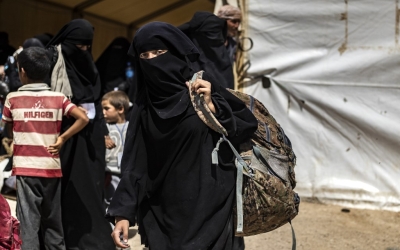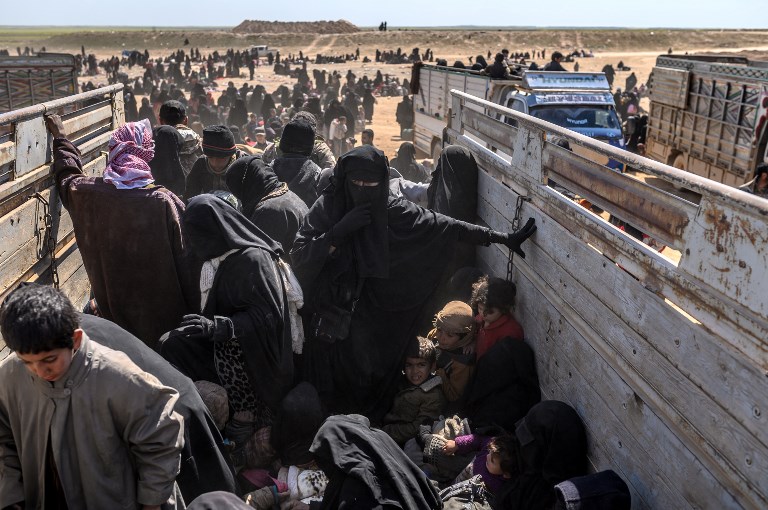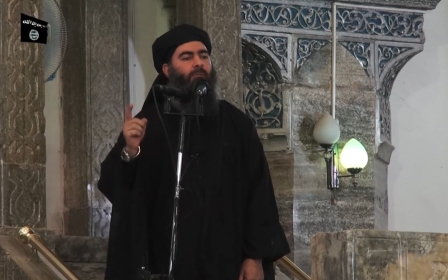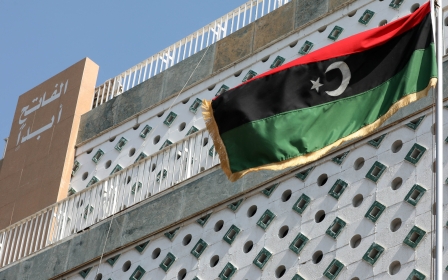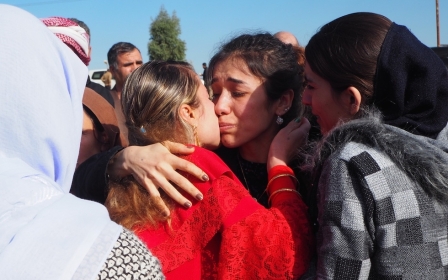Rescuers scour Syria for Yazidis still trapped in enslavement
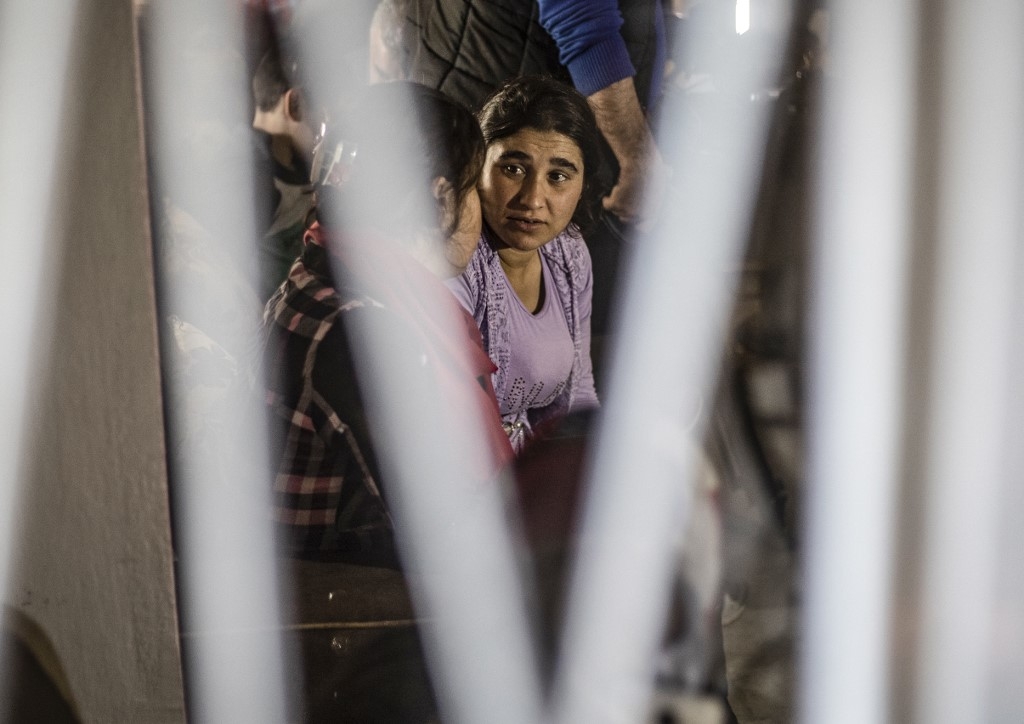
Seated in the back of a dimly lit fast-food restaurant in a mall in Iraqi Kurdistan, Ali Hussein scrolls through WhatsApp messages on one of the two phones he keeps with him at all times.
He cautiously looks around before leaning across the booth to play a voice memo sent to him by one of his Islamic State (IS) informants in Syria.
“Look, I don’t want to sell this girl to Turkish side because I don’t have any interest in that. Each organ could be sold for $60,000-$70,000, but I won’t do that,” the low, raspy voice says.
'Each organ could be sold for $60,000-$70,000'
- Islamic State informant
“Ali, it is better to buy her with this price - $45,000 - because I’m positive that another Yazidi girl was sold for more.”
Purchasing the girl at this price was a bargain, the man argued. Her organs, after all, could be trafficked on the black market for much more.
New MEE newsletter: Jerusalem Dispatch
Sign up to get the latest insights and analysis on Israel-Palestine, alongside Turkey Unpacked and other MEE newsletters
Over a series of WhatsApp voice memos, Hussein’s contact would later claim that the young girl, originally captured by IS at age four, was now living with an emir of an al-Qaeda affiliated group in Syria.
The communication continued on and off for more than two years, and included several proof-of-life videos. In one clip seen by Middle East Eye, a small girl dressed in a pink hijab and red sweater quietly identifies herself and mumbles the names of her parents before her captor stops recording.
After a daring rescue operation that involved his original IS contact, a series of middlemen and local brokers, Hussein managed to return the girl to what remained of her family. They paid $18,000.
Based in the northern Iraqi city of Dohuk, Hussein is among a handful of so-called liberators in the Yazidi community. Originally a schoolteacher, he turned to this line of work after his own escape from IS in the summer of 2014.
Using the names and phone numbers he obtained during his 15-day stint in captivity, Hussein was able to gain entry into a private Telegram account for IS fighters. From there, he made his pitch.
“Whoever was interested in selling their girls would contact me,” Hussein said. “After receiving photos and videos, I would discuss with them the price.”
Since 2016, he has rescued 49 Yazidi women and children, including four from non-IS captors. Their rescues bring some much-needed hope to the Yazidi community, a long-suffering ethnic and religious minority considered devil worshippers by IS.
Sold by IS to others
In August 2014, the militant group overran the Yazidi ancestral homeland of Sinjar, killed thousands of men and enslaved the women and children in what the United Nations would later call a genocide.
Roughly 2,800 Yazidis are still missing, according to the Yazidi Rescue Bureau in Iraq’s Kurdistan Regional Government. Most are feared dead - perished in coalition air strikes on former IS territory or killed by their terrorist captors.
But Yazidi advocates and rescuers say a significant number of the missing women and children are now in the hands of other militant groups and trafficking rings, abandoned by their original abductors as they fled the last IS outpost in Syria.
“The girls were sold to various factions and fighters when [IS] was defeated in Deir Ezzor and many fled the area,” said Ziyad Rustam, an official with Yazidi House, an organisation in northern Syria which reunites rescued Yazidis with their families in Iraq.
Of the 250 women and children who have passed through Rustam’s safehouse, most were discovered in al-Hol camp, the Kurdish-run facility in northern Syria housing IS wives and their children. Roughly a dozen survivors were found elsewhere in northeast Syria, according to Rustam.
He says Yazidi House has also sheltered five from Idlib, the rebel-held province in northwest Syria where the Syrian government and its Russian allies have been waging a deadly offensive. Idlib is home to several rival opposition factions, including Turkey-backed rebels and the dominant Hayat Tahrir al-Sham group, which was once affiliated with al-Qaeda.
Both Hussein and Abdullah Shrem, a beekeeper-turned-rescuer, say they’ve rescued several Yazidis from militants affiliated with various groups across Syria and are convinced many more will turn up with non-IS actors.
Search for the missing
In March 2019 - nearly five years after IS declared its self-proclaimed caliphate - the group lost its last shred of territory. The US-led coalition and the Syrian Democratic Forces declared victory over the group in Baghouz, a small Syrian town located on the border with Iraq in the Deir Ezzor countryside.
“We were expecting that after the fall of Baghouz and other IS areas, the operations would be easier,” said Shrem, the former beekeeper who has freed nearly 400 Yazidis since 2014.
“The geographic region that they are in has expanded, and it became harder to find the captives,” he said.
Following the group’s territorial defeat, negotiators say the remaining Yazidis are now scattered across Syria, Iraq and even neighbouring Turkey, where some fled with their captors after IS’s final stand in Baghouz.
“IS is not active on the ground as it was before, so it makes it difficult to locate them,” said Hussein. “This is making my mission harder and harder.”
Under IS captivity, Yazidi women and children were bought and sold like livestock. Some women were traded into sexual slavery via messenger apps or Facebook, and others bought in-person at slave bazaars in IS-controlled cities.
No such slave trade exists for the hundreds of Yazidis that advocates believe are still alive and want to be rescued. Hussein says this has forced him to start from scratch, creating an entirely new list of contacts inside Syria and Iraq. It took him more than a year to gain their trust.
Post-IS slave trade
These days, Hussein says the new captors are demanding as much as $20,000 per person. In some cases, they’re asking for even higher sums - once $50,000 - to fund their own escapes to Turkey or Europe.
'We’ve known families who’ve had to beg to collect money to rescue their family members'
- Murad Ismaeel, Yazidi activist
The cost is out of reach for most Yazidi families still languishing in camps across northern Iraq, afraid to leave the relative safety of their tents for their homes in Sinjar.
“This places a big toll on the families,” said Murad Ismaeel, the co-founder and executive director of Yazda, an advocacy group. “We’ve known families who’ve had to beg - to go door-to-door - to collect money to rescue their family members.”
But the families know the more time that passes, the worse their chances of bringing their loved ones home. Some brainwashed children may not even want to return.
“They don’t even know who they are,” said Ismaeel. “Everything has been lost over time.”
Middle East Eye delivers independent and unrivalled coverage and analysis of the Middle East, North Africa and beyond. To learn more about republishing this content and the associated fees, please fill out this form. More about MEE can be found here.


